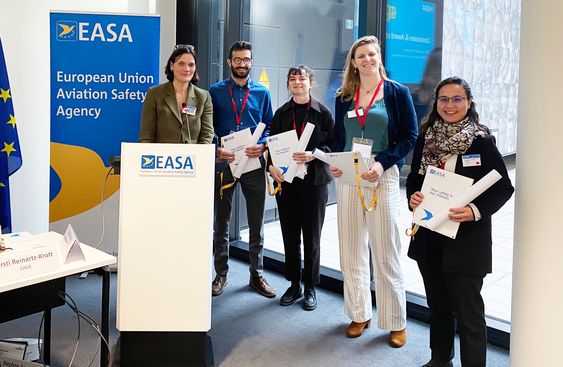Cologne, Germany, 2023-Mar-30 — /Travel PR News/ — The European Union Aviation Safety Agency (EASA) has recognised four doctorate students at the first edition of the European_Academia @EASA conference 2023. The conference marks an important step for EASA in building closer relations with academia and promoting links between academia and industry.
The two-day conference was part of an initiative set up to engage with the next generation of aviation scientists from European academia. The event focused on four main topics that reflect some of the current challenges and novel technologies that lie ahead for aviation: “Artificial Intelligence in aviation”, “Impact of climate change in aviation”, “Environmental sustainability” and “Safety risk management”.
“We are a knowledge-based organisation”, said EASA Certification Director Rachel Daeschler at the opening of the conference, “Everything we do, all the decisions we are taking, the rules we are writing are based on knowledge. We are absolutely convinced that partnerships with academia will significantly enrich our own knowledge horizon and help us further.”
At the end of the conference, the following PhD students were presented with an award, recognising the quality and pertinence of their work:
- Suzanne Salles (CERFACS / ISAE-SUPAERO) – Impact of climate change and extreme weather phenomena on the air transport system: Modelling the impact of atmospheric variables and their uncertainty on the performance of an aircraft during take-off: Towards the adaptation of air traffic operations to global warming’
- Gabriele Luzzani (Politecnico di Torino) – Artificial Intelligence (AI) in aviation: ‘Study and development of a real-time pilot monitoring system’, envisaging a collaborative and autonomous cockpit assistant (Human-AI Teaming – HAT) which, among others, monitors pilot’s health and cognitive workload.
- Rebekka van der Grift (Delft University of Technology) Environmental sustainability: ‘Measurement driven Doc.29 aircraft noise modelling’, aiming to validate and improve aircraft noise modelling by implementing acoustic measurements into various model components.
- Lidia Serrano Mira (Universidad Politécnica de Madrid) – New approaches and methods for safety risk management: ‘Definition of a methodology for the determination and application of a variable separation minima between aircraft in flight in an en-route environment’
The winners of each category will have the chance to engage bilaterally with EASA in the coming months to exchange on their projects. The selection of winners was made based on the abstracts submitted in advance and the presentations by the students during the event.
The conference allowed EASA to gain insights on certain aspects of new technologies and new challenges, while students got an opportunity to get feedback on the operational application of their research work. It was also a networking opportunity for the future aviation professionals, industry stakeholders, aviation authorities and EASA experts. Throughout the event, very good exchanges with the audience showed the benefits of gathering stakeholders and engaging with EASA and its Scientific Committee.
“Translating research into innovation is important for the development of societies. In aviation, it is important to set out and maintain an innovation pipeline to ensure that we have a continuous flow of knowledge from academia via research organisations into those entities who are then taking care of industrialisation.”, said the Chair of the EASA Scientific Committee, Prof. Dr. Peter Hecker (Technical University of Braunschweig).
The event attracted more than 60 external participants, coming from academia, industry, member states, research centres and other organisations. It was the call for abstracts launched in July last year. Around fifty PhD students from several countries in Europe submitted their PhD abstracts to EASA. From those, twenty were selected to present their studies at EASA to an audience made up of students, professors, aviation authorities and industry professionals and EASA staff.
Note to editors
About European Union Aviation Safety Agency – EASA
The European Union Aviation Safety Agency (EASA) is the centrepiece of the European Union’s strategy for aviation safety. Our mission is to promote and achieve the highest common standards of safety and environmental protection in civil aviation. Based in Cologne, the Agency employs experts and administrators from all over Europe.
Media Contact:
Janet Northcote
Head of Communication
European Union Aviation Safety Agency
Email: communications@easa.europa.eu
Source: EASA
###

